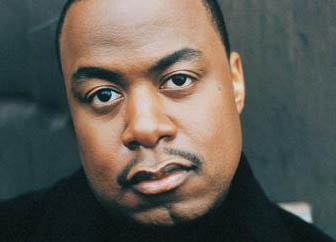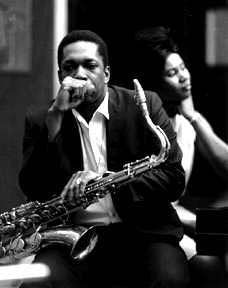NICHOLAS PAYTON / “Fela 1”
New Orleans has always been a trumpeter’s town, a place where the brass was blown red-hot and funky, even when they be playing pretty, the horn be skeeting goo, a musical ejaculation that makes both womens (and mens) scream and shout. That’s just the tradition. Our jazz tradition. And while everybody be knowing about Wynton Marsalis, let me tell you something, he wasn’t the first, won’t be the last and show ain’t the onliest one tearing up the atmosphere.“I knew after I recorded Dear Louis (a centennial tribute to Louis Armstrong) that I was closing a chapter on the kind of records I wanted to make. I’m still playing jazz but from the perspective of a man of my age and experiences. All of the musicians I love and respect, like Ornette Coleman, John Coltrane and Bill Evans, made statements that had not only personal, but cultural relevance to the times in which they lived. It was significant for me to do a project that embodied that.”
—Nicholas Payton
Plus, you know every mouth got its own taste, and for me, the trumpet flavor I crave is Nicholas Payton on any given Sunday when he be bearing down like a peg-legged man stomping a roach. Until you hear this bear of a brother grab a melody like it’s a naked lady he fiending to love, until you hear that, you ain’t heard nothing. I promise you…

Which brings me to Exhibit A (and there ain’t but one exhibit necessary to win this case): “Fela 1” from Nicholas’ Sonic Trance CD. First, we got to acknowledge that he got this shit from Miles, the vamps and the trumpet wah-wah. Second, we got to acknowledge that what he did with it, Miles was never able to do. Imagine a wah-wah trumpet played with the intensity of Coltrane and the finesse of Miles combined with a New Orleans swagger that, if it were walking down the street in any place but New Orleans, it would get arrested for indecent exposure. Imagine that. Cause that’s what you will hear when Nicholas Payton does his thing to the trumpet.
I am aware of a bunch of trumpeters who mined this particular vein (Roy Hargrove, Graham Hayes, Eric Truffaz, just to name a few), but ain’t none of them played no shit like this; oh my lord! (Rhetorical question: why do we be calling on the Lord when we be coming? Good God. Jeeezzz-susss!).
Nicholas must of got hold to the spirit of Buddy Bolden. It’s dirty, it’s nasty, it’s filthy. Goddamn, it’s beautiful.
—Kalamu ya Salaam
P.S. If you dig this, go to this site and you can see and hear Nicholas doing more of his trumpet thing: http://66.241.215.116/nicholaspayton/nicintro.html
Plus, up in the jukebox is some lagniappe (a little something extra): a concert excerpt with Nicholas messing around on the bottom of his horn. This brother is a monster.
Listen to your lady
Back around the time this album dropped, I remember hearing Nick talk about some of the things that influenced him to record a fusion project after playing so much trad (traditional jazz). Nick mentioned a lot of things, but the one thing that stuck with me was when Nick talked about the influence his new wife had on his playing. I’m paraphrasing so I may have this all wrong, but Nick said something like, “My wife was always asking me, ‘Since you listen to all of this different music at home, why don’t you play some of it? Why don’t you play everything you like?’”
It’s something every young jazz or blues musician has to confront eventually. How do you stay relevant while playing a style of music—Damn! I’m listening to the “Fela 1” track while I’m typing this; Nick is working the shit out of that wah-wah!…I’m gonna have to rewind—that most young people are no longer interested in? Some musicians say they don’t care; they just play what they want. But I think the honest jazz or blues musician will admit that it’s disconcerting (to put it mildly) that their primary audience is, and will always be middle-aged and mostly white. It’s both ironic and symptomatic of our class / culture / political / economic system that jazz and blues—both of which began as expressions by and for (mostly) young, (mostly) poor and (mostly) Black musicians—are increasingly the exclusive province of middle-class and middle-aged white folks. Not that there’s anything wrong with that. (Ha-ha.)
On another subject, Baba. You were talking about the Miles influence, and there’s an obvious parallel here, in that Miles—after marrying Betty Davis—went in a rock/funk direction. Some say Miles did this almost has a way to compete with Jimi Hendrix (who, as rumor has it, was sleeping with Miles’ wife). Others say the rock/funk stuff was merely an attempt to change with the times…or, as still others say, ahead of the times. Still, whichever way you see it, Miles’ wife Betty was definitely the impetus for Miles’ electric fascination, just as Nick credits his wife for encouraging him (Nick) to introduce some modern sounds and styles into his music.
—Mtume ya Salaam
Women are the soul of our music
Oh, you want to go there. Just check out the jazz scene when there are a bunch of Black women in the audience—hell, check it out when there is just one “superfine-black-intelligent-fox” (to use a superlative that was happening in our circles circa the late Sixties) sitting right down front. The music changes because the social atmosphere has been rearranged just by the presence of black women.
Dear readers, y'all can laugh or wonder what the hell Kalamu is talking about—is he really saying what it looks like he saying?—but I’m going to tell you I’m saying even more than you think I’m saying: black women are the soul of our music and to the degree that their influences and presence, not to mention their participation, is included in the music, to that same degree the music jumps to another level.

Y'all ever seen that Chuck Stewart picture of Trane sitting on a piano bench next to Alice Coltrane? They both listening to the music. On the one hand Trane was clearly in the way-out-a-sphere but on the other, and more important hand, his wife was at his side!
Which is all why I get agitated and disturbed by a bunch of the misogyny running through contemporary American culture. If you don’t respect women, you don’t respect life. If men spent more time loving and respecting women, we would spend less time hating and killing other men (and women). Period! (Period, even as I know that statement cries out for fuller discussion.) Anyway, Mtume, the observation you’re making is deeper than whale shit, especially considering you mentioned Miles, who is the archetype of the modern Black male, who, for various reasons that we won’t go into right now, is so capable of love, yet so prone to violence in his relationship with women.
—Kalamu ya Salaam
This entry was posted on Sunday, April 2nd, 2006 at 1:12 am and is filed under Contemporary. You can follow any responses to this entry through the RSS 2.0 feed. You can leave a response, or trackback from your own site.
2 Responses to “NICHOLAS PAYTON / “Fela 1””
April 3rd, 2006 at 3:11 pm
Thanks both of you for exposing me to a Wah Wah Trumpet! I would have easily thought this was synth’ed, til I listened carefully. The track does sound Miles-ish, but played with such furvor that even the elder Miles wouldn’t have bothered the melody that much…although he had his tracks too.
Now for the secondary plot to this article…the influence of women. Ever since the Adam and Eve days, women have had an influence on men. So why would this be any different. And of course the influence is reciprocated. But much like peer pressure, ultimately the person is responsible for his actions.
kalamu sez
adam & eve, no way… you see, that’s the western take on male/female relations, blames the sista for the brotha’s downfall, & once we accept that myth, forever makes man & woman antagonists… check isis & osiris (if you want to go back to biblical times) for a whole other view, a view that presents that it is woman who is dedicated to pulling man back together after his destruction by his brother (set). we have to stop blaming women for our weaknesses, failures & faults… don’t read influence like a bad thing (eve causing adam to eat & die), hear me now, man (& all our music) is incomplete without women. woman & man together is completion, the essence is not simply that they influence us or we them, but rather that we complete each other. i am simply saying we men got to stop blocking out women, need to embrace & respect women. seen? heard?
April 4th, 2006 at 2:57 pm
Agreed. Ashford and Simpson, Peaches and Herb, and countless other couples/duos would agree too. My reference as to influence was not a negative thing. What I was saying from a psychological point of view is that the BLAME/FAME still rests with the one who acts, not necessarily the person of influence. In the case of Payton, the influence was a positive thing. I’m certain that in Betty Davis and even Cicely Tyson’s case, the influence was positive too. Now, if you really want to split hairs, reasearch a few Blues-men or women and see where there “relational” influence with women lies. Don’t get me wrong Kalamu, I understand what you are saying. Brothers and Sisters need to stop finding fault with one another and love each other…or as I’ve heard often…LOVE THE HELL out of each other.
As music is often a tapestry of life, you’ll find the positive and negative influences of relationships throughout each note, key, and measure.
Leave a Reply
| top |